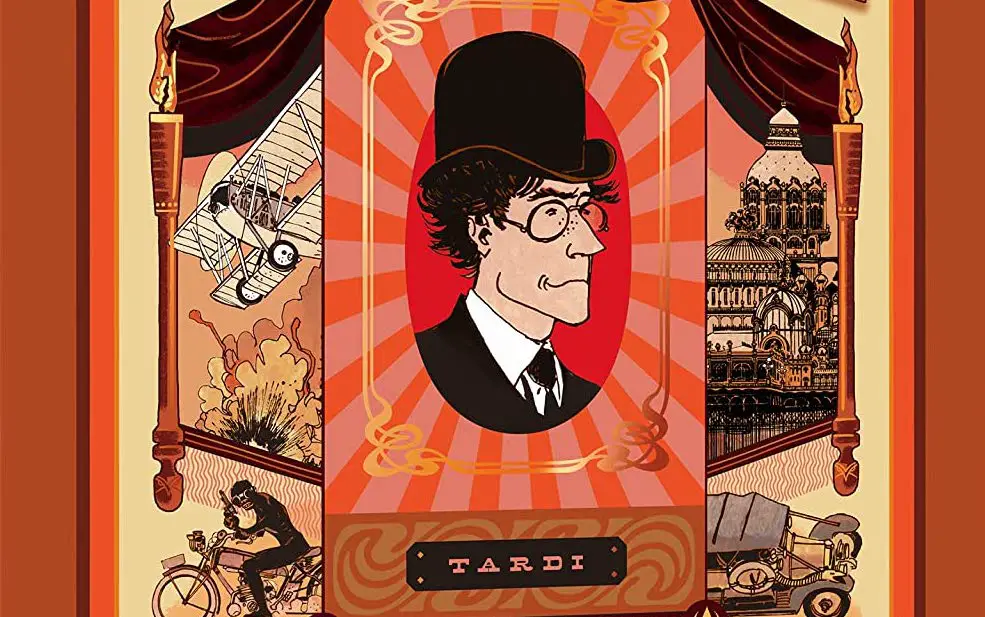Farewell, Brindavoine, written and drawn by Jacques Tardi and translated by Jenna Allen, is a bande dessinées graphic novel published by Fantagraphics and translated from Tardi’s original work, Adieu Brindavoine narrating the first exploits and halfhearted antics of Tardi’s character Lucien Brindavoine, originally published in 1974. This new edition is part of a series of books showcasing the career of Jacques Tardi.
Tardi, a renowned and widely influential artist to the Franco-Belgian comics of the 20th century, has his first published iteration of the character, Lucien Brindavoine, venturing within the pages of this book.

On a world-spanning pulp adventure from Paris to Istanbul to Afghanistan, Tardi envisions a setting rife with bandes dessinées themes of French and British occupation and entanglement in a world portrayed through a lens tainted by truly racist depictions of societies outside of white Europe — the kind of despicable 19th and early 20th century racism that formed the propaganda machine of modern global imperialism and justified the brutal conditions of colonization and the horrific treatment to non-white nations and peoples across the world.
Unsettling stereotypes and offensive racial caricatures combined with the rampant use of a racial slur for native peoples throughout the book invokes a difficult question: what do we do with the past? The book doesn’t seem to be an attempt at historical fiction — a mirror to reflect and contrast the brutalism’s of yesterday to the injustices today — but rather a romp through “exotic” lands where entire ethnicities and human beings are reduced to stage props.
Tardi’s vision of proto-steampunk technology in a wonderous world and the subsequent critique of war and industrialization is of course inventive and profound but the epithet, “s***ages”, is a slur. A racial pejorative used to justify some of the most heinous human rights abuses against native peoples the world has ever witnessed.

Like The Adventures of Tintin or Indiana Jones, the problems of Farewell, Brindavoine is a consequence of centuries of colonialist terrorism — tasteless caricatures and senseless, tone-deaf violence towards nonwhite people. Why are German soldiers of World War I written with more humanity and character than the “nomads” being recklessly slaughtered? Why does the protagonist have a crisis of conscience only when violence is enacted upon his British counterpart and partner or a German soldier, and not when it is suggested that the “nomads” are being fed to a monstrous gorilla or are being actively gunned down? Why is one kind of violence and carnage used thematically to excite an adventure and enrich tension, whilst another is used to illustrate a profound failing against a moralistic integrity?
This early work of Tardi has its place in historical context, but where the art and culture has grown in the last four and a half decades make it impossible and pointless to produce considerations of Farewell, Brindavoine without a serious analysis of the exploitation expressed in this book. Everyone that Lucien meets or interacts with, is just canon fodder to some kind of undue disillusionment to his personal growth. Everyone is just a nail and Lucien is just a hammer, and that leaves plenty of room for a lot of bigotry.

Tardi’s consummate art — wildly detailed panels filled with prolific and inventive architecture/design and experimental plot expression — is unable to take facility and be properly appreciated when the disturbing racist imagery and language used (indicative of this book and the other similar genre classics of the era) act as cement shoes to the narrative focus.
Join the AIPT Patreon
Want to take our relationship to the next level? Become a patron today to gain access to exclusive perks, such as:
- ❌ Remove all ads on the website
- 💬 Join our Discord community, where we chat about the latest news and releases from everything we cover on AIPT
- 📗 Access to our monthly book club
- 📦 Get a physical trade paperback shipped to you every month
- 💥 And more!














You must be logged in to post a comment.